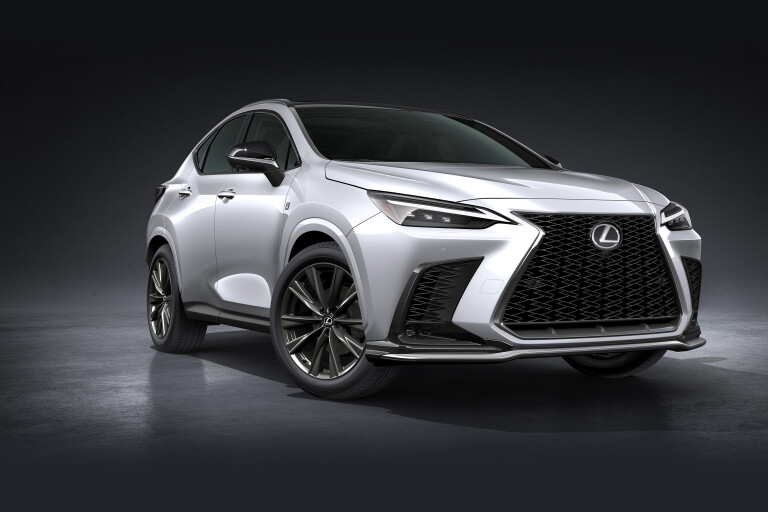
Snapshot
- Based on similar platform to RAV4
- Three variants for Aus, one hybrid
- PHEV not yet confirmed locally
Lexus’s most popular model is entering its next generation, with the new Lexus NX medium SUV now revealed to the world.
In a presentation to local media, Lexus confirmed three models of the new SUV will initially come to Australia, with a fourth plug-in hybrid models – the brand’s first – unconfirmed but likely to follow afterwards.
The new NX, based on Lexus’ version of the TNGA-K platform (referred to as GA-K by Lexus) underpinning the Toyota RAV4, a model not only frequenting the top of the sales charts, but one we’ve consistently reviewed favourably.
This is good news for the NX, which will arrive in Australia in NX 350h, NX 350 and NX 250 guises to rival the Mercedes-Benz GLC, BMW X3, Audi Q5 and Volvo XC60.
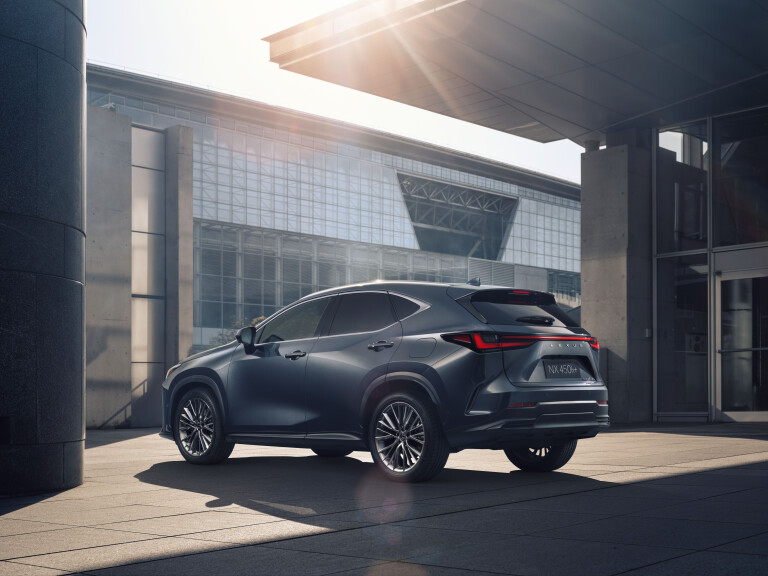
As NX 350h, which will be the top-spec until the PHEV arrives, Lexus’s new SUV will be powered by a 2.5-litre four with a hybrid drivetrain with options for AWD and FWD versions.
Lexus hasn’t confirmed outputs for Australia, but the RAV4’s version of the hybrid FWD produces 160kW, and the AWD 163kW. Expect Lexus to top these numbers.
Additionally, the AWD version will be able to put on a strong rear bias, with the petrol engine working the front wheels until the rears are needed for drive and traction, with up to 80 per cent of drive headed to the rear e-motor.
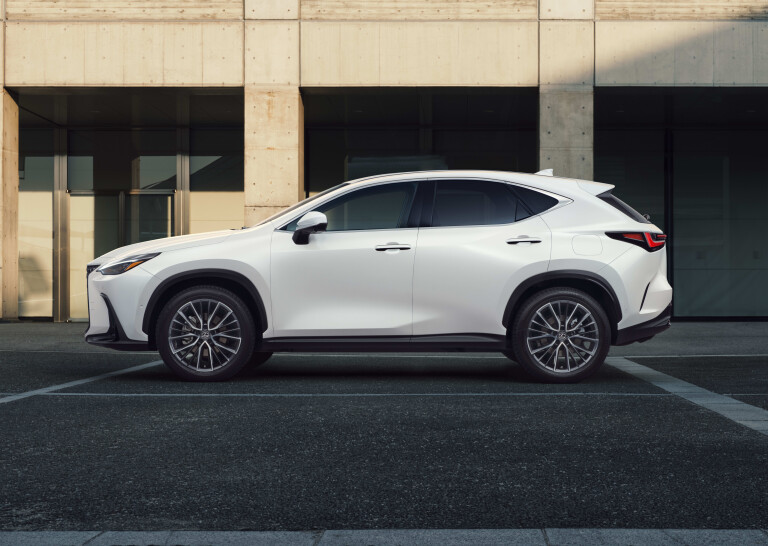
The mid-level Lexus NX 350 will run with a 2.4-litre turbo four, using a new full-time AWD system which can alter drive between 75:25 and 50:50 front/rear.
The engine, newly developed and not yet present in any other Toyota or Lexus models, features Lexus’s first centre-injection direct-injection system and was designed to meet “increasingly stringent exhaust and fuel economy regulations.”
Finally, the Lexus NX 250 will feature a 2.5-litre petrol engine in FWD only, but will be the lightest NX with, Lexus claims, “instant response.” Toyota’s version of this engine makes 152kW and 243Nm in the top-spec RAV4 Edge, but in AWD guise.

All versions will use a similar version of Lexus’s Direct Shift eight-speed automatic transmission, though each will be tuned to suit the drivetrain it’s mated to.
While the Lexus NX bears some similarities to the RAV4 in its underpinnings, the chassis has been altered in a couple of ways by the engineers at Lexus.
For example, the rear battery packs were moved further to the centre of the chassis. This will concentrate the NX’s centre of gravity, while also allowing designers to create a more rounded lower-rear shape.
Lexus also says it had to adjust the platform to be more suited to the 20-inch wheels some versions of the NX will use.
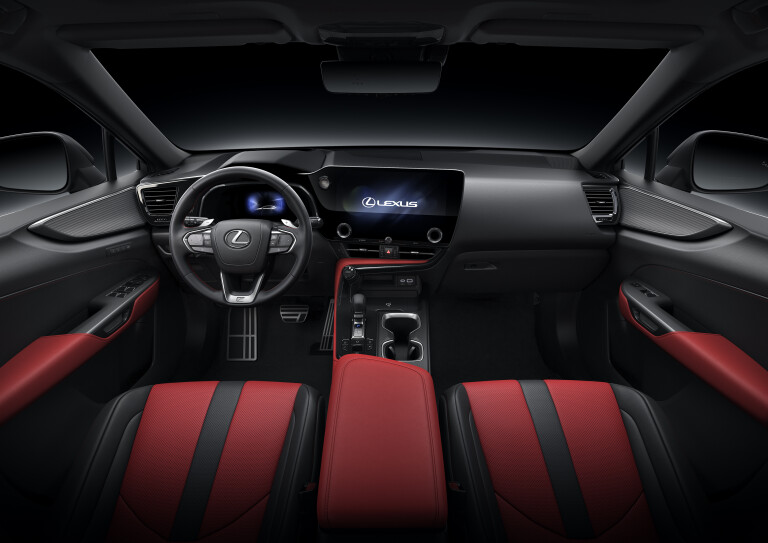
Its design has taken a leap further into ‘premium’ too, in much the same way the RAV4 became a more purposeful-looking car in its current iteration.
The large spindle grille seems more fluently integrated with the car’s front, and the rear badging has even followed the lettering trend other brands have taken to, spelling out ‘Lexus’ in capitals.
Inside, there are more hints of Toyota, though Lexus has done a stellar job of improving the high-end visual appeal of the cockpit.
A 14-inch touchscreen, some will note, has replaced the need for the somewhat maligned (by press, at least) trackpad infotainment controls.
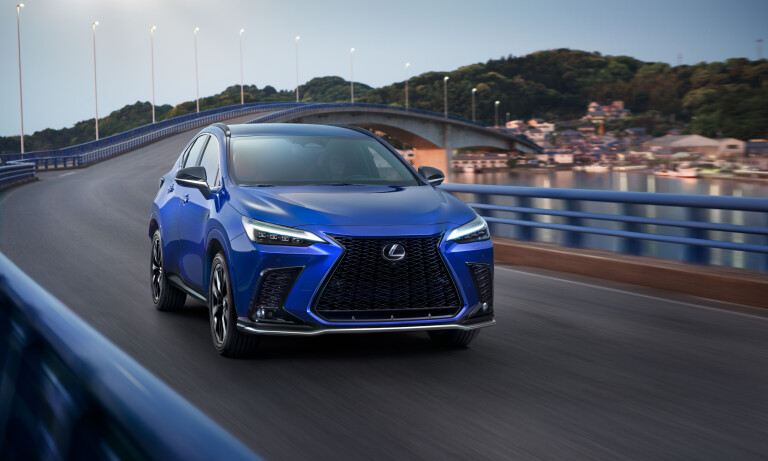
The interior is focused on Lexus’s new ‘Tazuna Concept’, essentially the description is has given to the manner in which it hopes to create a “better communication between driver and vehicle.”
Two F-Sport specifications will be available, under the 350h and 350 variants, with 20-inch alloy wheels, a lip spoiler on the lower bumper, and small body additions for a generally more aggressive look.
Finally, the NX 450h+ PHEV (plug-in hybrid electric vehicle) version, which is still not confirmed for Australia, will be the first in Lexus’s model range, utilising the history its parent brand has with electrification tech.
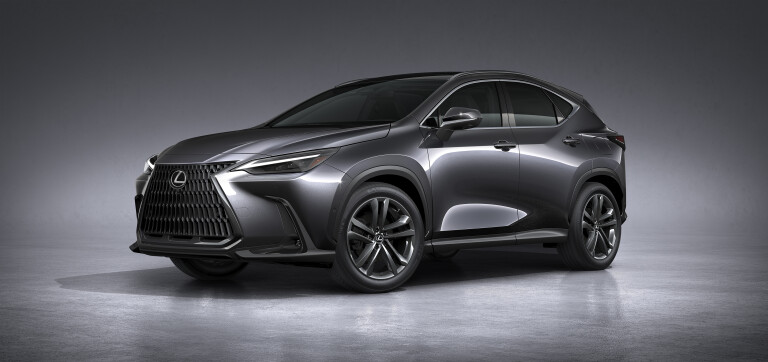
Journalists were told the company plans to have half of its range electrified by 2025, on the path to net-zero emissions by 2050, but Lexus will continue to sell hybrid vehicles well into the future as a way to lower emissions.
The Lexus NX 450+ PHEV will feature a 2.5-litre petrol engine, front and rear motors, and a Lithium-ion battery with 18.1kWh.
A prototype for the PHEV returns an approximate 75km EV range, Lexus representatives told media, though that figure may change when homologation is finalised.
When will the 2022 Lexus NX come to Australia?
The new 2022 Lexus NX will come to Australia in November 2021, with pricing and local specifications to be confirmed closer to launch.

COMMENTS